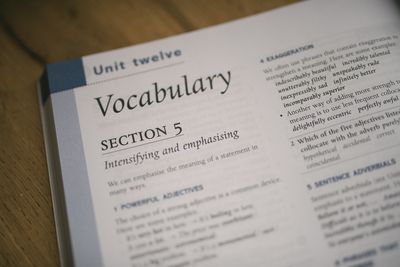How to make it more interesting and rewarding during the lesson?
What is the best practice in vocabulary teaching?
Having worked with children for many a year, I strongly believe that the best practices in vocabulary teaching are part of a context-based strategy. As researches point out, the context method is the most effective way to provide the students with vocabulary instruction
[1, p. 17].
Typically, an online session begins with a small talk when some new words can be introduced unintentionally. The student shares some news about their day, what their pet did, etc. and is often encouraged to learn some new words to communicate better.
At later stages of the lesson, small talk can be used to evaluate the student’s learning of the new words during the lesson to ‘inhibit any recency effect in working memory’ [2, p. 112].
The context method is the most effective way to provide the students with vocabulary instruction
Singing along is yet another way to encourage vocabulary learning. Students learn parts of the lyrics, look up a few of new words trying to understand and memorise new phrases and expressions.
Learning vocabulary through singing has been shown to be an effective way to facilitate language learners vocabulary retention and learning through the interaction of melody and lyrics [3, p. 171].
At the same time, as for any concerns about the distarction created by the melody, accompanying singing, music doesn’t hinder the vocabulary acquisition process, as it was confirmed by researchers [9, p. 15]
and must be encorporated in teaching EFL as a means of motivating reluctant students due to its proved ability of the brain's auditory system to "engage the brain’s reward system" [4].
Thus singing, as a well researched effective practice in vocabulary acquisition, should be incorporated in every learning session with younger students of English.
It's worth noting here, that despite being young, younger students of English often prefer songs by The Beatles to everything else, especially (wait for it!), the children's songs.
What?! Why?
Learning vocabulary through singing has been shown to be an effective way to facilitate language learners vocabulary retention and learning
The reason is quite simple. This preference is due to the children's songs having a lot of low frequency words. They are intentionally written in that way to facilitate young native speakers’ vocabulary learning, which makes them suitable for more advanced students of English only and a second choice during the lesson.
Curiously enough, the latest discoveries in the area of neurological research, as reported by medicalxpress.com, the songs by The Beatles were included in the experiments and shown to be effective in improving memory in older participants when familiar with the song through activiation of the reward brain system [5].
During the lesson, the beginners work through Cambridge ESL materials, learn high frequency words and expressions appropriate to their level of English. New words are learned in the context of the task, employing the visual aids of Google Images if necessary.
The visual contextual support has been demonstrated to be effective in teaching vocabulary through the means of engaging the student in learning words in new contexts [10, p. 570].
Younger students of English often prefer songs by The Beatles to everything else, especially (wait for it!), the children's songs.
More advanced students are challenged with specialised texts. For example, the students are taught new ways of describing sounds, sights, feelings, smells by studying how imageries use words to paint a picture in the reader’s mind. As it has been found in some studies, learning new words through imagery requires more cognitive energy ‘when manipulating and thinking about a word’, which significantly improves retention [6, p. 2266-2267].
Learning about similies and metaphors helps the student to make more meaningful connections between the words, engaging them into activities aimed at vocabulary acquisition, metaphor awareness enhancement and vocabulary retention [7, p. 569].
In order to develop a more precise vocabulary, students work with synonyms and antonyms of familiar words, which has been noted as one of the effective ways to expand vocabulary [8, p. 130].
In conclusion, knowing about different ways students learn vocabulary enables EFL teachers to make research based choices when designing courses for our students.
1. Ali Akbar Ansarin and Mohammad Reza Banan Khojasteh. Retention in Meaning-Based Vocabulary Instruction. SKY Journal of Linguistics 26 (2013), 7–19. http://www.linguistics.fi/julkaisut/SKY2013/Ansarin_Khojasteh.pdf
2. The Vocabulary-Learning Strategies of Foreign-Language Students.
Michael J. Lawson and Donald Hogben Flinders University. Language Learning 46:1, March 1996, pp. 101-135. https://www.academia.edu/1247358/The_Vocabulary_Learning_Strategies_of_Foreign_Language_Students
3. Vanessa Natale Rukholm. Singing to Speak: An Examination of Adult L2 Learners and Vocabulary Learning Through Song. Italica Vol. 92, No. 1 (SPRING 2015), pp. 171-192 (22 pages). https://www.jstor.org/stable/43895229
4. Longitudinal changes in auditory and reward systems following receptive music-based intervention in older adults https://www.nature.com/articles/s41598-022-15687-5
5. Can listening to the Beatles improve your memory? New research says music just might stir the brain. https://medicalxpress.com/news/2022-07-beatles-memory-music-brain.html
6. International Conference on Education and Educational Psychology (ICEEPSY 2012) The impact of imagery strategy on EFL learners’ vocabulary learning. Yagoub Zahedia, Mortaza Abdib. https://www.sciencedirect.com/science/article/pii/S1877042812056649
7. FRANK BOERS Metaphor Awareness and Vocabulary Retention. Free University of Brussels and University of Antwerp. Applied Linguistics 21/4: 553-571. https://www.researchgate.net/publication/249238022_Metaphor_awareness_and_vocabulary_retention
8. Reading in a Foreign Language. October 2007, Volume 19, No. 2 pp. 120–136 .The effects of synonymy on second-language vocabulary learning Stuart Webb Koran Women’s Junior College. Japan. https://files.eric.ed.gov/fulltext/EJ777733.pdf
9. Medina, Suzanne L. The Effects of Music upon Second Language Vocabulary Acquisition. Studies in Literature and Language. 1990. https://eric.ed.gov/?id=ED352834
10. Kamal Nasrollahi, Samran Daneshfar. The Effect of Visual Contextual Support and Glossary of Words on Guessing Meaning of New Vocabulary Items in English by Pre-university Male EFL Students. Journal of Language Teaching and Research, Vol. 9, No. 3, pp. 561-572, May 2018.
https://www.researchgate.net/publication/324873090_The_Effect_of_Visual_Contextual_Support_and_Glossary_of_Words_on_Guessing_Meaning_of_New_Vocabulary_Items_in_English_by_Pre-university_Male_EFL_Students
Nenad Stojkovic - Vocabulary, section 5 https://www.flickr.com/photos/nenadstojkovic/49659928856/





